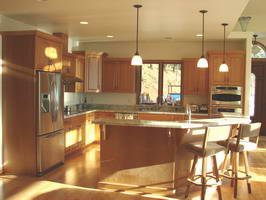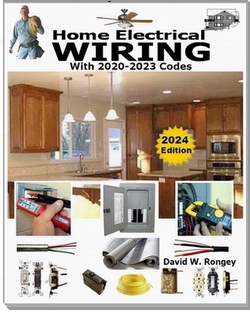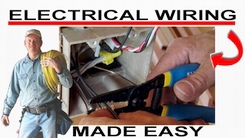Don’t Burn Your House Down – The Key to Safe Extension Cords
 '; ';
|
How to Make Sure Your Extension Cord is Safe: Extension Cord Safety, The Key to a Safe Extension Cord and The Problem With Extension Cords. © By: Dave Rongey |
Extension Cord Safety
Electrical Question: Is it safe to connect two 110 volt extension cords to separate circuits to make 220 volts?
- I have been told that one can connect two 110volt extension cords and produce 220volts. How is that done?
- Is it simply connecting two cords that are plugged into two different 110volt circuits?
- I’m trying to keep my son from burning the house down so I need the risk factors. if it can be done, I need the CORRECT way to do this please!
This electrical repair question came from: Bob inTexas.
Dave’s Reply:
Thanks for your electrical wiring question Bob.
How to Make Sure Your Extension Cord is Safe
Unsafe Extension Cords
- Bob, what you have been told may work, but it is definitely Not Recommended!
- The power source for an electrical device should not come from two locations or two separate sources, here’s a few reasons why:
- The two separate circuits may not be configured correctly.
- The source of power cannot be disconnected from a single location.
- The circuit wiring and components must be installed together as one unit.
Examples of Dangerous Electrical Conditions
- Jeff, in Baker County, Florida says: When we plug things in like a phone charger the cord end is hot when we touch it.
- A Hot Plug
A hot plug or may be an indication that the electrical wiring of the plug or cord may not be sized properly, or that the electrical connection of the plug to the outlet is loose or deteriorating. - A Melted Plug
A melted plug is typically found where portable electrical equipment is used such as space heaters or air conditioning units that are used for long periods of time. If this condition is observed then the electrical circuit requirements of the equipment should be compared to the electrical circuit that the unit is plugged into. Typically the owners manual of such equipment will specify that a dedicated circuit is required. - A Worn Out Wall Outlet
If the cord is plugged into a wall outlet then the outlet may be worn out and need to be replaced. - A Hot Outlet or Burnt Outlet
A hot outlet or burnt outlet is a signal that the outlet and wiring is in need of repair. - A Fire Hazard
Continued use of the wall outlet will cause continued deterioration and over heating which can become a dangerous fire hazard.
- A Hot Plug
Safe Extension Cords
- Let’s think about what an extension cord really is:
- An extension cord is an extension of an electrical circuit, and the circuit must be adequately sized to provide the right circuit power for the device that will be connected to the circuit using the extension cord.
- It is important that the extension cord is sized correctly to the circuit that it is being plugged into otherwise if the wire size and or the insulation type is incorrect then it is possible that the extension cord may become overloaded and overheated which could lead to a dangerous fire hazard.
Extension Cord Application
- Extension cords can be extremely helpful when the cord and the application is correct, and that is the key:
- What is the extension cord going to be used for?
- The application requiring an extension cord is not mentioned in the main question, however that is the beginning point of any electrical circuit, especially when it comes to extension cords.
- Identifying the electrical circuit load or the required power is essential in order to determine the correct circuit that will be used as the power source.
More about Electrical Safety
Home Electrical Safety Checklist
- Home Electrical Extension Cords
- Safeguard your family against the hazards associated with extension cords.
- Problems associated with home electric extension cords occur far too often. Here are some tips about home electric extension cords.
More about Home Electrical Extension Cords
Home Electrical Safety
Electrical Safety Articles covering several topics of home electrical safety and Do-It-Yourself Electrical Safety.
Electrical Safety in the Home
A new approach to keep kids and electricity apart with hopes to prevent children from being injured by electricity.
The following may also be helpful for you:
|
|
Be Careful and Be Safe - Never Work on Energized Circuits!
Consult your Local Building Department about Permits and Inspections for all Electric Wiring Projects.
More articles about Electrical Repair and Home Electrical Wiring: |
|
| « Previous | Next » |
Adding a Remote Control Module to a Ceiling Fan |
Neutral and Ground Wires in a Sub Panel |















